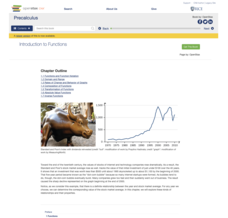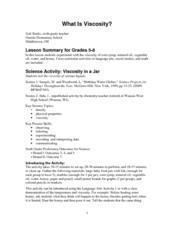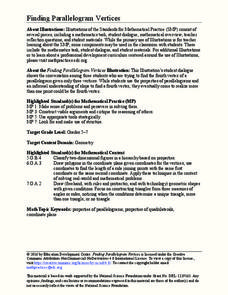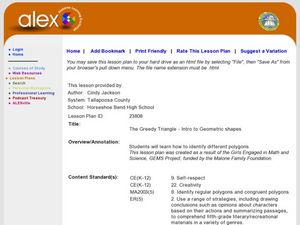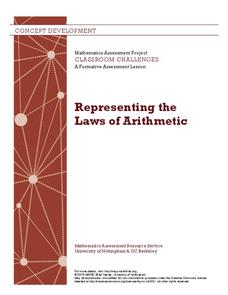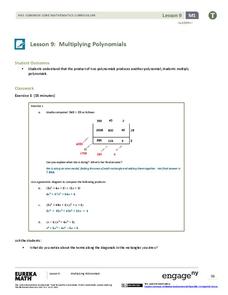Curated OER
Multiplying
There is a step-by-step example here to help young multipliers solve 12 equations, all of which have one 2-digit and one 1-digit factor. The method displayed encourages breaking the two-digit number into tens and ones, multiplying each...
Flipped Math
Unit 1 Review: Analyze Graphs and Expressions
Get in one last practice. Pupils work through 12 problems and a performance task to review the topics in Unit 1. The problems cover analyzing and modeling with graphs, algebraic properties of equality, and adding, subtracting, and...
Curated OER
Commotion About Motion
Second graders are introduced to different types of motion. They make rolling spider toys and race them on different surfaces to invsetigate forces and motion. Pupils make glue "spider webs" for their spiders after testing different...
Curated OER
Multiplication: Bugs Can Multiply, So Can I!
Develop multiplication skills with your class. Youngsters will visualize multiplication as repeated addition. Then they will create a multiplication bug book and discover arrays as a strategy for multiplication problem solving....
Curated OER
Fact Families
With a few extra numbers, these fact families would be complete! After looking at an example, scholars write in the sums and differences for six equations as part of three different fact families. This is really for beginners to this...
Curated OER
Scientific Method: How Many Drops of Water Fit on a Coin?
Young investigators conduct an experiment using the scientific method. They see how many drops of water fit on a coin; have them conduct several different trials. This involves making a hypothesis, looking at controls, and introducing...
Illustrative Mathematics
Guess My Number
Make a game out of solving equations. This particular activity works well for pairs of learners. Follow the instructions to have player one pick a number and player two verbally give an equation. Participants need to make sense of a...
EngageNY
Choosing a Model
There's a function for that! Scholars examine real-world situations to determine which type of function would best model the data in the 23rd installment of a 35-part module. It involves considering the nature of the data in addition to...
EngageNY
Modeling with Exponential Functions
These aren't models made of clay. Young mathematicians model given population data using exponential functions. They consider different models and choose the best one.
EngageNY
Matrix Multiplication and Addition
To commute or not to commute, that is the question. The 26th segment in a 32-segment lesson focuses on the effect of performing one transformation after another one. The pupils develop the procedure in order to multiply two 2 X 2...
Rice University
Precalculus
Take a step beyond Algebra 2. Learners use the eBook to learn concepts from the typical Precalculus course. Content starts off with a short review of functions in general and moves on to the basic functions, finishing up with more...
Curated OER
What Is Viscosity?
Students experiment with the visocosity of corn syrup, mineral oil, vegetable oil, water, and honey. They research viscosity before beginning. Pupils draw the conclusion that the marble sinks more slowly in the liquids with greater...
Mathematics Assessment Project
Solving Linear Equations
Linear equations are the focus of activities that ask learners to first complete a task that involves interpreting algebraic expressions and solving linear equations. They then take part in a card activity matching...
Education Development Center
Finding Parallelogram Vertices
Four is the perfect number—if you're talking about parallelograms. Scholars determine a possible fourth vertex of a parallelogram in the coordinate plane given the coordinates of three vertices. They read a conversation...
Curated OER
Solving Equations by Factoring
In this algebra worksheet, learners use the Zero Product Property to solve polynomial equations by factoring. Application problems are included. The one page interactive worksheet contains fifty-four problems. The...
EngageNY
End-of-Module Assessment Task - Algebra 2 (Module 3)
The last installment of a 35-part series is an assessment task that covers the entire module. It is a summative assessment, giving information on how well pupils understand the concepts in the module.
Curated OER
The Greedy Triangle-Intro to Geometric Shapes
In this geometry lesson, learners read The Greedy Triangle and use geoboards to construct geometric shapes. They identify the number of sides and angles each shape has.
Curated OER
Exponent Rules
Pupils use calculators to work independently to discover the rules for working with exponents. The lesson plan requires the use of a TI-nspire handheld and software.
BW Walch
Solving Exponential Equations
Introducing exponential equations means learners need to take all the rules and tricks they learned for exponents and actually apply them. This presentation comes to the rescue by touching on changing bases in exponential...
Mt. San Antonio Collage
Exponential and Logarithmic Functions
High schoolers grow their skills exponentially after completing this thorough learning exercise. Going from simple to difficult, it hits all the major skills regarding exponential and logarithmic functions including simplifying, solving,...
Mathematics Assessment Project
Representing the Laws of Arithmetic
Sixth graders connect numerical expressions to geometric area. They first complete an assessment task requiring them to identify area models for numerical expressions. Learners then participate in an activity to match area models to...
Willow Tree
Multiplying Polynomials
Make two parts into a whole. Scholars learn to multiply polynomials to create a simplified polynomial expression. Polynomials include monomial, binomials, and trinomials.
Mathematics Assessment Project
Deducting Relationships: Floodlight Shadows
Try to figure out what happens with shadows as a person moves between two light sources. A formative assessment lesson has individuals work on an assessment task based on similar triangles, then groups them based on their...
EngageNY
Multiplying Polynomials
There's only one way to multiply, right? Not when it comes to polynomials. Reach each individual by incorporating various representations to multiplying polynomials. This lesson approaches multiplying polynomials from all angles. Build...
Other popular searches
- Mathematical Properties
- Math Properties
- Math Properties of Addition
- Powerpoint Math Properties
- Addition Properties in Math
- Math Addition Properties
- Mental Math Properties
- 4 Mathematical Properties
- Math Properties Games
- Pictures of Math Properties
- Elementary Math Properties
- Math Properties Projects












